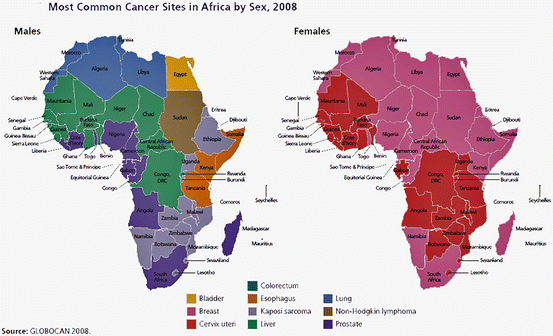WHO reports that 70% of deaths caused by cancer occur in low and middle-income countries where it is very difficult to access diagnosis and treatment leading to late-stage identification of the disease and minimal chance of survival. One of the things that come to my mind when I think of Africa and cancer is the lack of awareness about the disease and extremely limited access to treatment options. Cancer was not considered a public health priority in most African countries until its burden rose highly in the last two decades. Even after being double-burdened with infectious diseases and non-communicable diseases (NCDs), public health crises that requiring immediate responses (mainly the prevention and control of outbreaks, and major challenges like counterfeit/ falsified and substandard medicines) consume the majority of resources and efforts.

https://link.springer.com/book/10.1007/978-3-319-52554-9
It is extremely difficult for African patients to pay for the expensive cancer treatments abroad, and good quality care is not made available making it harder for them to fight and survive the disease. The problem gets only worse when people migrate to other parts of the world where they would remain in migrant status for an indefinite period without accessing healthcare services and life-saving treatments. Multi-faceted barriers relating to awareness, diagnostics, funding, health system capacity, public and private sector commitment, health workforce, etc. severely restricted access to cancer treatments in Africa.
Efforts to expand access to cancer treatments in Africa represent WHO’s response and the Global Health Community’s alliances with the pharmaceutical industry. WHO developed the Global action plan for the prevention and control of NCDs 2013-2020 in 2013 aiming to reduce premature mortality from cancer and other non-communicable diseases by 25% in 2025. WHO’s responses include works with global health partners to increase political commitment for cancer prevention and control, and health systems strengthening for better healthcare interventions in Africa. Multinational pharmaceutical companies such as Pfizer collaborate with other global health actors to provide access to critical cancer treatments in a few African countries. Although I would say these efforts addressed some aspects of the problem, they were just steps to advanced cancer treatment in Africa and not the ultimate solutions. The problem needs sustainable solutions from global and regional actors. African countries share common factors that I assume are causing the types of cancer that are common amongst the African population and undermining interventions. The way cancer is misunderstood, diagnosed and treated in Africa is worse than is in other parts of the world.
As a health lawyer, I always consider laws as ways by which policies, guidelines, and standards are implemented at national and local levels. The world knows that soft-law mechanisms helped with the prevention and control of NCDs. African Union (AU), on the other hand, has had great experience in preparing Model laws on different subject matters including on Medical Products Regulation. For this reason, I believe it’s time to think of ways on how new or existing model laws can be developed at the AU level to respond to leading NCDs, including cancer, in the region. This law could incorporate compulsory and voluntary measures to address the critical challenges the region has in terms of funding, knowledge of risk factors and resources. Most importantly, in low-income settings such as Africa, a model law can legalize strategies that can expand access to life-saving treatments for these diseases. Deeper engagement of organizations such as the AU and the WHO AFRO Office that acknowledged and placed the right to health at the center of responses is needed for advancements in cancer care to reach patients in Africa.



